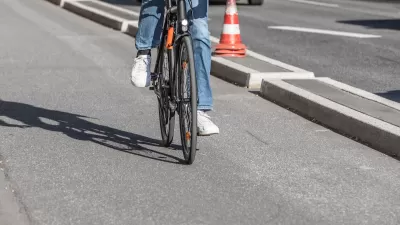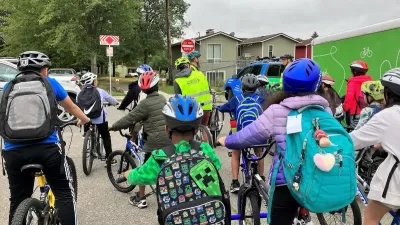According to one Canadian couple living in Holland, walkable cities and good bike infrastructure aren't just a Dutch anomaly.

Streetsblog's Kea Wilson interviews Melissa and Chris Bruntlett, a Vancouver couple who, after moving to the Netherlands, wrote a book titled Curbing Traffic: The Human Case for Fewer Cars in our Lives, "which they hope will inspire advocates to question the narrative that car-light life is a luxury reserved only for the Dutch."
The Bruntletts examine four harmful myths that discourage cycling and cycling infrastructure in the U.S. According to them, many Americans believe bikes have always played a role in Dutch life, but "the Netherlands initially embraced the automobile, until a wave of traffic-safety activism in the early ’70s and the 1973 oil embargo crisis made universal car dependence controversial and impractical." Early efforts to build cycle tracks often met with local resistance, "with some business owners even prying up the tracks in the middle of the night."
Another misconception: car-light cities are harmful for people with disabilities. Instead, Melissa says, " in a low-car city that’s designed well, we’re inherently providing streets that give people more space to move in wheelchairs, with canes, and other mobility aids, too. In that kind of space, people with disabilities aren’t just accommodated; virtually the entire public realm is open to them."
The third myth: Holland's street safety protests tipped the scales toward discouraging private cars. In fact, it was the Dutch government's 1979 Noise Abatement Act that helped force communities to cut down on car traffic.
The fourth myth explored by the Bruntletts deals with the common perception that good bike infrastructure is an entirely Dutch creation. "[T]here are communities all over the world that are doing this. You can learn from the Netherlands, or from Montreal, or Auckland, New Zealand, or Bogotá, Colombia," says Chris. "Any city can achieve this, but politicians need to put their money where their mouths are and build the people-centered places they all say they want."
FULL STORY: Four Myths About Car-Light Cities, Busted

Maui's Vacation Rental Debate Turns Ugly
Verbal attacks, misinformation campaigns and fistfights plague a high-stakes debate to convert thousands of vacation rentals into long-term housing.

Planetizen Federal Action Tracker
A weekly monitor of how Trump’s orders and actions are impacting planners and planning in America.

San Francisco Suspends Traffic Calming Amidst Record Deaths
Citing “a challenging fiscal landscape,” the city will cease the program on the heels of 42 traffic deaths, including 24 pedestrians.

Adaptive Reuse Will Create Housing in a Suburban Texas Strip Mall
A developer is reimagining a strip mall property as a mixed-use complex with housing and retail.

Study: Anti-Homelessness Laws Don’t Work
Research shows that punitive measures that criminalized unhoused people don’t help reduce homelessness.

In U.S., Urban Gondolas Face Uphill Battle
Cities in Latin America and Europe have embraced aerial transitways — AKA gondolas — as sustainable, convenient urban transport, especially in tricky geographies. American cities have yet to catch up.
Urban Design for Planners 1: Software Tools
This six-course series explores essential urban design concepts using open source software and equips planners with the tools they need to participate fully in the urban design process.
Planning for Universal Design
Learn the tools for implementing Universal Design in planning regulations.
Heyer Gruel & Associates PA
JM Goldson LLC
Custer County Colorado
City of Camden Redevelopment Agency
City of Astoria
Transportation Research & Education Center (TREC) at Portland State University
Jefferson Parish Government
Camden Redevelopment Agency
City of Claremont





























